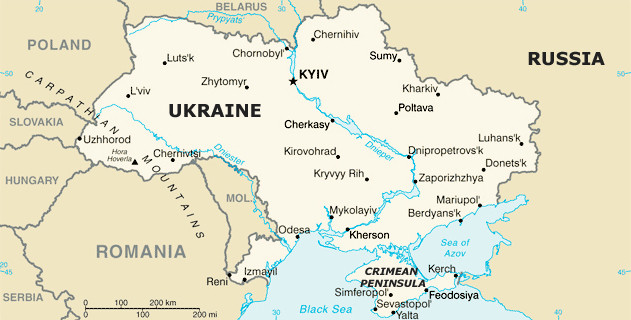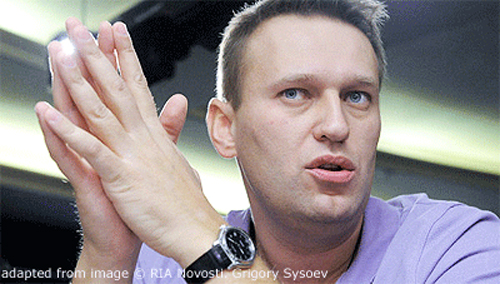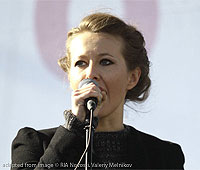How Russia’s opposition learned to stop worrying and love Crimea

A recent statement by a prominent Russian opposition figure is testament to an unpalatable truth: Crimea’s annexation is popular with Russia’s ‘liberal elite.’
(opendemocracy.net – Daniel Kennedy – March 31, 2015)
Daniel Kennedy is an Associate Editor at oDR. He is an Associate at Global Partners Digital, a social purpose company working to protect and promote human rights values online
Even by Russian standards, Ksenia Sobchak is a rather contradictory public figure. Having launched her television career as an announcer on Russia’s remake of ‘Big Brother’ (‘Dom-2’), Sobchak became a political talk show host on TV Rain, one of Russia’s few independent news channels.
The daughter of the late Anatoly Sobchak, the former mayor of St Petersburg and a close friend of Vladimir Putin, Ksenia Sobchak was also a prominent opposition figure in Moscow’s 2011-2012 protest movement, despite persistent rumours that the Russian president is secretly her godfather.
Herself a scion of privilege, in 2011 Sobchak appeared in a viral video chastising Vasily Yakimenko, leader of the pro-Kremlin youth group Nashi, for lunching at a fashionable and expensive Moscow restaurant. Recently, following the assassination of Boris Nemtsov, Sobchak was reported to have permanently left Russia after she was named on a ‘hit-list’ of anti-government activists. Sobchak, who regularly travels abroad, denies she has gone into exile.
The liberals
This week, Sobchak commented positively on Russia’s annexation of Crimea in March 2014. In an interview with the Polish edition of Newsweek, Sobchak stated that ‘for me, just like most teenagers in Soviet times, Crimea brings up positive emotions: holidays, first love and so on. If I had been president then, quite possibly I myself would have dared to reunite Crimea [with Russia].’ Sobchak went on to declare that there is ‘no sense’ in discussing the return of Crimea to Ukraine and that ‘the only thing we can do right now is carry out a new, honest referendum for its inhabitants.’
 In making these comments, Sobchak joined the ranks of a number of oppositionists who have publically declared their support (or at least reluctant acceptance) of Crimea’s annexation. In an interview with Ekho Moskvy in October 2014, Alexei Navalny, possibly the most vocal and public of Russia’s ‘non-systemic’ opposition, said that ‘despite the fact that Crimea was seized in violation of all international norms,’ it was now ‘de facto part of the Russian Federation’ and would not become part of Ukraine again.
In making these comments, Sobchak joined the ranks of a number of oppositionists who have publically declared their support (or at least reluctant acceptance) of Crimea’s annexation. In an interview with Ekho Moskvy in October 2014, Alexei Navalny, possibly the most vocal and public of Russia’s ‘non-systemic’ opposition, said that ‘despite the fact that Crimea was seized in violation of all international norms,’ it was now ‘de facto part of the Russian Federation’ and would not become part of Ukraine again.
Once Russia’s richest and most powerful oligarch until he was arrested in 2003 (in a case Amnesty International described as ‘politically motivated’), Mikhail Khodorkovsky has expressed similar sentiments. Commenting on Navalny’s statements, Khodorkovsky said that he too would not return Crimea to Ukraine, although he expressed regret that the situation would likely be a problem ‘for decades.’
The nationalists and leftists
This enthusiasm for Crimea’s annexation isn’t limited to Russia’s ‘liberal’ opposition. Its nationalist and leftist camps have also reacted with approval to Crimea’s ‘reunion’ with Russia.
Nationalist critics of Putin, like Eduard Limonov and Yegor Kholmogorov, have completely changed their tune on government policy. Now when they criticise the Russian government, they do so for not annexing more Ukrainian territory in the Donbas region, utterly devastated by bloody separatist conflict in the past year.
Sergei Udaltsov, the radical-leftist leader of the ‘Left Front’, who was jailed for four-and-a-half years in July 2014, has also spoken approvingly of the annexation – indeed, Udaltsov considers the dissolution of the Soviet Union itself to be a mistake. In Udaltstov’s words, Crimea’s annexation is a ‘small, but important’ step towards reviving the USSR.
The avant-garde art group, ‘Voina,’ whose members are closely associated with Pussy Riot and which shot to prominence by painting a giant phallus on a drawbridge near the FSB’s St Petersburg headquarters, has also publically expressed its support for the annexation of Crimea. The group’s leader, Oleg Vorotnikov, was unequivocal: ‘We’re happy that Crimea has returned to Russia and are pleased for the Crimeans,’ he said. ‘I’m so proud of my country, for the first time in a long time.’
A popular annexation
It is possible Sobchak’s statements were an attempt to reaffirm her ultimate loyalty to Russia’s elite in the wake of her supposed ‘exile.’ This interpretation seems unlikely, however, given that in the same interview she went on to declare that ‘Putin now considers himself a God and that’s where the danger lies’ – hardly the most fawning description of her country’s leader. More likely, Sobchak’s words are in fact testament to what many in the West will likely regard as an unpalatable truth: Crimea’s annexation is fantastically popular among Russia’s population (with 84% currently claiming to support it) and that popularity extends to the country’s ‘liberal elite.’
There are numerous factors that explain this popularity. As Sobchak notes, Crimea was a popular holiday destination, especially for young pioneers, and many Russians have fond memories of spending summers there as children. Moreover, the region’s significance in Russian popular mythology of World War Two is immense and has only increased in the last year. Despite the illegality of the annexation under international law, Russians of many political stripes view the region’s referendum as a genuine (if perhaps problematic) expression of the local population’s political will and thus as essentially democratic and legitimate. Regardless of what has happened in the past, many would likely now view any sort of return of Ukrainian de facto soverignty as a betrayal of this population.
Many liberal oppositionists have grown to increasingly distrust the West (particularly for the complicity of its financial sector in Russia’s rampant corruption) and they genuinely fear for the loss of Russia’s naval base at Sevastopol. Meanwhile, for figures like Khodorkovsky and Navalny, who harbour serious political ambitions, publically stating opposition to a reality accepted and approved of by an overwhelming majority of Russia’s population is tantamount to political suicide.
Rethinking sanctions
None of this means the West is obliged to accept Crimea’s annexation as a legal act. The fact that something is popular does not make it moral, or legal, or desirable. But if the West is sanctioning Russia in the hope that this will spur regime change (as many suspect), this should probably give them reason to pause.
Even if we accept that sanctions will ultimately lead to a change in Russia’s government – which is itself highly debatable – and that the new leadership of Russia will include prominent non-systemic liberals – which is extremely unlikely – there’s little reason to expect a liberal Russian government to return Crimea to Ukraine, which is, ironically, the stated goal of Western sanctions.
Article also appeared at opendemocracy.net/od-russia/daniel-kennedy/how-russia%E2%80%99s-opposition-learned-to-stop-worrying-and-love-crimea bearing the following notice:
 This article is published under a Creative Commons Attribution-NonCommercial 3.0 licence. If you have any queries about republishing please contact us. Please check individual images for licensing details.
This article is published under a Creative Commons Attribution-NonCommercial 3.0 licence. If you have any queries about republishing please contact us. Please check individual images for licensing details.

